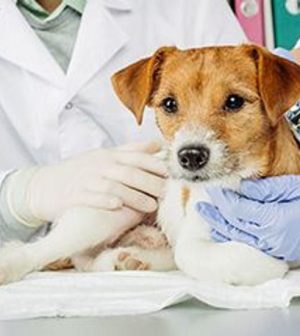- 10 Strategies to Overcome Insomnia
- Could Artificial Sweeteners Be Aging the Brain Faster?
- Techniques for Soothing Your Nervous System
- Does the Water in Your House Smell Funny? Here’s Why
- Can a Daily Dose of Apple Cider Vinegar Actually Aid Weight Loss?
- 6 Health Beverages That Can Actually Spike Your Blood Sugar
- Treatment Options for Social Anxiety Disorder
- Understanding the Connection Between Anxiety and Depression
- How Daily Prunes Can Influence Cholesterol and Inflammation
- When to Take B12 for Better Absorption and Energy
Report Shows Arizona Man Infected His Dog, Cat With COVID-19

An Arizona man infected his dog and cat with the new coronavirus, according to a new case study that researchers say is the first in the United States to use genetics to document such transmission.
The owner wasn’t vaccinated, did little to protect his pets, and had houseguests who weren’t vaccinated. The owner recovered from COVID-19 and both pets were asymptomatic. However, genetic testing showed that the owner, cat and dog all were infected with an identical strain of coronavirus, and the virus spread from the owner to either the dog or cat, or both, the researchers concluded.
They explained that the pets were confined to an apartment and had little or no opportunity to be exposed to the virus independently, so it’s highly unlikely that they infected their owner. Also, it was the pets’ human who exhibited COVID symptoms first.
The ongoing study is one of five pilot studies nationwide examining COVID-19 in animals, but it is the only one to include genomic sequencing of the virus from both pets and owners.
“This case study was the first example we had from the project that demonstrated the likelihood of virus transmission from a pet owner to animals in the household,” said report author Hayley Yaglom, an epidemiologist at the Translational Genomics Research Institute (TGen) in Flagstaff, Ariz.
To protect their pets, owners should get vaccinated. If they do get COVID-19, they should wear masks when they’re around their pets and not cuddle or kiss them, or allow them to lick their faces or sleep with them, Yaglom advised.
While it’s not necessary to completely isolate from their pets, owners with COVID-19 symptoms should minimize contact as “best they can,” Yaglom said in an institute news release.
As of Sept. 1, more than 180 dogs and cats have tested positive for coronavirus in the United States, according to the researchers.
The study was published Nov. 1 in the journal One Health.
“This is a great example of using genomics to gain intelligence about pathogens,” said David Engelthaler, director of TGen’s Pathogen and Microbiome Division. “This study shows that we can not only use genomics to help track COVID variants across the globe, but we can also use this technology to track exact transmissions and, in this case, transmission from pet owners to pets.”
More information
The U.S. Centers for Disease Control and Prevention has more on pets and COVID-19.
SOURCE: Translational Genomics Research Institute, Nov. 1, 2021
Source: HealthDay
Copyright © 2026 HealthDay. All rights reserved.










